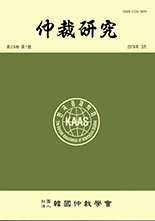- 영문명
- The Arbitrability of Derivative Claims in Korea
- 발행기관
- 한국중재학회
- 저자명
- 신연수(Yunsoo Shin)
- 간행물 정보
- 『중재연구』제35권 제2호, 3~21쪽, 전체 19쪽
- 주제분류
- 사회과학 > 무역학
- 파일형태
- 발행일자
- 2025.06.01
5,080원
구매일시로부터 72시간 이내에 다운로드 가능합니다.
이 학술논문 정보는 (주)교보문고와 각 발행기관 사이에 저작물 이용 계약이 체결된 것으로, 교보문고를 통해 제공되고 있습니다.

국문 초록
The arbitrability of derivative claims can be controversial because the statutory regime governing companies is generally considered collective and serves public interests, while arbitration is a tool for settling private disputes respecting private party autonomy. This paper argues that derivative claims should generally be arbitrable in Korea to provide a better way to resolve disputes according to the parties’ intention and for the benefit of the companies.
Korean statutes do not deny the arbitrability of derivative claims, and there are no public policy grounds to prohibit derivative claims in arbitration. First, as disputes over property, derivative claims fall within the definition and scope of arbitration under Article 3(1) of the Korean Arbitration Act. Second, provisions on derivative claims in the Korean Commercial Act or other applicable corporate laws that merely assume court jurisdiction should not be interpreted as a general prohibition invalidating the parties’ clear decision to resolve the dispute in arbitration. Third, respecting the statutory requirements for a shareholder’s standing to bring a derivative claim in the jurisdiction of incorporation, the legislature’s intention to balance the interests of relevant stakeholders will be well maintained in arbitration. Lastly, as seen in other jurisdictions that accept the arbitrability of statutory corporate claims, derivative claims between shareholders and directors should be allowed in arbitration because they are essentially contractual disputes that do not necessarily engage the rights of creditors or impinge on any statutory safeguards.
Moreover, for example, allowing the derivative claim under the Korean Commercial Act in arbitration, which permits claims against a relatively broad range of defendants, can resolve disputes between controlling shareholders (de facto directors) and minorities or between the joint venture partners can be resolved in a mutually beneficial way by protecting the company’s interests, ensuring damages are compensated and supporting the company’s ongoing business.
영문 초록
목차
Ⅰ. 문제의 소재
Ⅱ. 주주대표소송의 중재가능성에 대한 법적 근거 검토
Ⅲ. 중재합의의 범위
Ⅳ. 주주대표소송의 중재가능성 관련 외국 판결 검토
Ⅴ. 중재가능성 인정 시 실무상 유의점
참고문헌
키워드
해당간행물 수록 논문
참고문헌
관련논문
사회과학 > 무역학분야 BEST
더보기사회과학 > 무역학분야 NEW
- 한국 화장품의 대중국 수출 방안 - 한중FTA 활용 및 비관세조치 대응을 중심으로
- 국제 디지털 무역 협정 비교를 통한 소비자 보호 규범 고찰: 한국의 정책 함의
- 주주대표소송의 중재가능성
최근 이용한 논문
교보eBook 첫 방문을 환영 합니다!

신규가입 혜택 지급이 완료 되었습니다.
바로 사용 가능한 교보e캐시 1,000원 (유효기간 7일)
지금 바로 교보eBook의 다양한 콘텐츠를 이용해 보세요!



